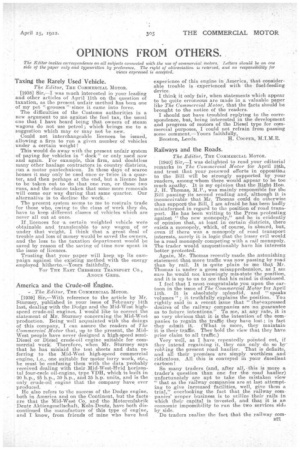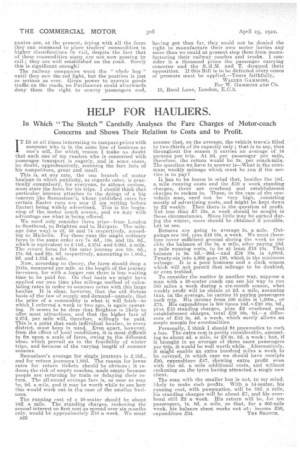OPINIONS FROM OTHERS.
Page 25

Page 26

If you've noticed an error in this article please click here to report it so we can fix it.
The E.iitor invites correspondence on all subjects connected with the use of commercial motors. Letters should be on one sae of the paper only and typewritten by preference. The right of abbreviation is refereed, and no responsibility for views expressed is accepted.
Taxing the Rarely Used Vehicle.
The Editor, THE COMMERCIAL MOTOR.
. [1988] Sir,—I was much interested in your leading and other articles of April 11th on the question of taxation, as the present unfair method has been one of my pet "-grouses "since it came into force. The difficulties of the Customs authorities is a new argument to me against the fuel tax, the usual one that I have heard being that owners of steam wagons do not use petrol; which brings me -to a suggestion which may or may not be new.
Could not interchangeable licenoes be issued, allowing a firm to run a given number of vehicles • under a certain weight?
This would do away with the present unfair system of paying for vehicles in " dock " or only used now and again. For example, this firm, and doubtless many other haulage contractors in country districts, run a motor 'pantechnicon. In these clays of scarce houses it may only be used once or twice in a quarter, and then perhaps at the end, but a licence has to be taken out to do that one run, or those two runs, and the chance taken that sonic more removals will come our way during that same quarter. Our alternative is to decline the work. • The present systemseems to me to restrain trade for those who' owing to the class of work they do, have to keep different classes of vehicles which are never all out at once.
If licences for -a certain weighted vehicle were obtainable and transferable to any wagon of or under that Weight, I think that a great deal of trouble and loss of money would be saved the owners, and the loss to the taxation department would be saved by reason of the saving of time now spent in the issue of licences.
Trusting that your paper will keep, up its campaign against the existing method with the energy employed hitherto.---Yours 'faithfully, For THE EAST CHESHIRE TRANSPORT CO., ANGUS GREG.
America and the Crude-oil Engine.
. The Editor, THE COMMERCIAL MOTOR.
[1939] Sir,—With reference to the article by Mr. Sturmey, published in your issue of February 14th last, dealing with the Dodge and the Mid-West highspeed crude-oil engines, I would like to correct the statement of Mr. Sturmey concerning the Mid-West production. Being well acquainted with the doings of this company, I can assure the readers of The Commercial Motor that up to the present, the MidWest people have never designed a high-speed semiDiesel or Diesel crude-oil engine suitable for commercial work. Therefore, when Mr. Sturmey says that he has mislaid the test sheets and data referring to the Mid-West high-speed commercial engine, i.e., one suitable for motor lorry work, etc., he must be confusing them with the data probably received dealing with their Mid-West-Hvid horizontal four-cycle oil-engine, type VD11, which is built in 20 h.p., 25 h.p., O h.p., and 35 h.p. units, and is the only crude-oil engine that the company have ever produced. Ile also refers to -the success of the Dodge engine, both in America and on the Continent, but the facts are that the Mid-West Co. and the Motorenfabrik
• Deutz Aktiengesellschaft, Koln-Deutz, have both discontinued the manufacture of this type of engine, and I know, from friends of mine who have had experience of this engine in America. that considerable trouble is -experienced with the fuel-feeding device.
I think it only fair, when statements which appear to be quite erroneous are made in a valuable paper like The Commercial Motor, that the filets should be brought to the notice of the readers.
I should not have troubled replying to the correspondence, but, being interested in the development and progress of motors of the Diesel type for commercial purposes, I could not refrain from passing some comment.---Yours faithfully, Beeston, Leeds. H. COOPER, M.I.M.E.
Railways and the Roads.
The Editor, THE COMMERCIAL MOTOR.
[1940_I was delighted to read your editorial remarks in The Commercial Motor for April 18th, and trust that your renewed efforts in oppositioa to the Bill will be strongly supported by your readers, among whom there would appear to he too much apathy. It is my opinion that the Right Hon. J. H. Thomas, M.P., was mainly responsible for the Bill passingits second reading and, although it is inconceivable that Mr. Thomas could do otherwise than suppore the Bill, I am afraid he has been badly misinformed in regard to the position of road transport. He has been writing to the Press protesting against "the new monopoly," and he is evidently of opinion that, at least in certain districts, there exists a monopoly, which, of course, is absurd, but, even if there was a monopoly of road transport interests, surely it is logic that the lesser evil would be a road monopoly competing with a rail monopoly. The trader would unquestionably have his interests better protected.
Again, Mr. Thomas recently made the astonishing statement that more traffic was now passing by road than by rail. It is quite plain to me that Mr. Thomas is under a gross misapprehension, as I am sure he would not knowingly mis-state the position, and it is up to us to see that his mind is disabused.
I feel that I must. congratulate you upon the cartoon in the issue of The Commercial Motor for April 11th. It is absolutely splendid, and "speaks volumes" it truthfully explains the position. You rightly said in a recent issue that " theeexpressed desires of the railway companies are no guarantee as to future intentions." To me, at any rate, it is so very obvious that it is the intention of the companies to regain the traffic they have lost ; in fact they admit it.. (What is more, they maintain it is their traffic. They hold the view that they have prior claim to all traffic.) Very -well, as I have repeatedly pointed out, if they intend regaining it, they can only do so byrob1,-.ing the present road haulier. That is definite, and all their promises are simply worthless and ridiculous. All this is conveyed in your dxceIlent cartoon So many traders (and, after all, -this is more a trader's question than one for the road haulier) unfortunately are apt to take the mistaken view "that as the railway companies are at last attempting to give increased facilities, well, give them a trial," overlooking the fact that the railway companies' proper business is to utilize their rails in which their capital is invested, and that it is an economic impossibility to run the two services side by side.
Do traders realize the fact that the railway corne21 panies are, at the present, trying with all the force they can command to place traders' commodities in higher classifications by rail, despite the fact that of these commodities many are not now passing by rail; they are well established on the road. Sureiy this is significant enough!
The railway companies went the " whole hog until they Saw the red light, but the position is just as serious as ever. Given power to operate goods. traffic on the roads, no Parliament could afterwards deny them the right to convey passengers and,
having got thus far, they could not be denied the right to manufacture their own motor lorries any more than we could at present stop them from manufacturing their railway coaches and trucks. I consider it a thousand pities the passenger carrying concerns and the S.A.M, and T. dropped their opposition. If this Bill is to he defeated every ounce of pressure must be applied.-Yours faithfully, ' WALTER GAMMONS, For W. GAMMONS AND CO. 10, Rood Lane, London, E.0.3.






























